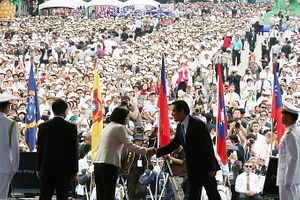Following the award by the Permanent Court of Arbitration (PCA) in The Hague in favor of the Philippines in its case against mainland China pursuant to the United Nations Convention on the Law of the Sea (UNCLOS), the Kuomintang (KMT) and the Republic of China (ROC) Presidential Office announced that Taiwan will not accept the ruling. Not only did my party and the Presidential Office reject the ruling that high-tide features in the Spratly Islands, including Taiping Island (garrisoned by the ROC continuously since 1956), are “rocks” and not islands, we both also reiterated the ROC’s sovereignty claims over the South China Sea islands and surrounding waters, and that the ruling is not legally binding on the ROC.
If there is a positive outcomes from today’s award, it is that President Tsai Ing-wen and her foreign policy advisers finally recognize the important role such claims have in order to maintain the ROC’s status as a sovereign country. In fact, the Presidential Office said that the government will make “every effort to safeguard the country’s sovereignty and territory and protect the interests of the country.” This country is of course the ROC, a fact that heretofore many in Tsai’s government and Democratic Progressive Party have been reluctant to use.
Successive ROC governments have maintained a “U-shaped line” claim in the South China Sea subsequent to the publication in 1947 by our government of the “Location Map of the South China Sea Islands.” This map included the Tungsha (Pratas), Shisha (Paracels), Chungsha (Macclesfield Bank), and Nansha (Spratlys) island groups. In Taiwan the line is often referred to as a U-shaped line, and outside Taiwan as the eleven-dash line or (subsequent to adjustment by mainland China) the nine-dash line. On July 15, 2015 our Ministry of Foreign Affairs issued a detailed explanation of our claim, noting that from the perspectives of history, geography, or international law, the Nansha, Shisha, Chungsha, and Tungsha islands, as well as their surrounding waters, are an inherent part of ROC territory and waters. The San Francisco Peace Treaty, which entered into effect on April 28, 1952, as well as the Treaty of Peace between the ROC and Japan which signed that same day, together with other international legal instruments, reconfirmed that Taiwan and the islands and reefs in the South China Sea should be returned to the ROC.
Taiping Island (Itu Aba) has groundwater wells, natural vegetation, and phosphate ore and fishery resources, and personnel stationed on Taiping cultivate vegetables and fruit and raise livestock. Taiping indisputably qualifies as an “island” according to Article 121 of UNCLOS as it can sustain human habitation and economic life of its own. Today’s award by the PCA does not change this, and the strength of the PCA’s credibility on this issue is limited given that it did not visit Taiping. Similarly, the award in favor of the Philippines that disputed land formations in the South China Sea are not islands and thus not entitled to a 200-nautical mile exclusive economic zone was not based on site inspections, and can only lead to greater confusion and disputes among the competing claimants.
Former President Ma Ying-jeou actively promoted a South China Sea Peace Initiative that would peacefully utilize South China Sea resources, and today’s award illustrates how prescient this KMT proposal was. Similar to the successful East China Sea Peace Initiative that resulted in significant progress in Taiwan-Japan relations, the South China Sea Peace Initiative calls on all concerned parties to shelve sovereignty disputes, exercise restraint, agree to resolve disputes peacefully, establish a code of conduct, respect the United Nations Charter and Convention on the Law of the Sea, and jointly develop resources.
Last September, President Tsai told foreign diplomats that if elected, she will “engage in dialogue with different parties with the purpose of finding a diplomatic solution” to address sovereignty disputes. In the aftermath of the forthright statements made by her office following the PCA award, perhaps it is time for President Tsai to adapt a more concrete policy such as the South China Sea Peace Initiative to replace her preferred ambiguity. The urgency of the situation amid potential for conflict makes this a time when President Tsai should not seek pride of authorship and waste time crafting a new name, but accept the KMT’s sovereign-defending South China Sea policy.
Eric Huang is the head of the international department at the Kuomintang.
































